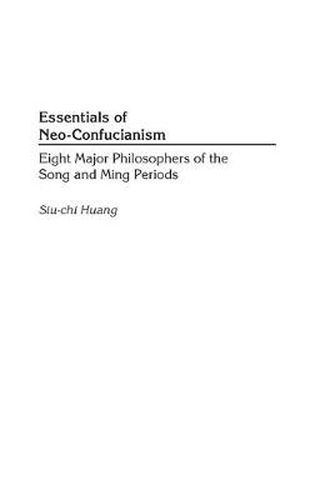Readings Newsletter
Become a Readings Member to make your shopping experience even easier.
Sign in or sign up for free!
You’re not far away from qualifying for FREE standard shipping within Australia
You’ve qualified for FREE standard shipping within Australia
The cart is loading…






This analytical presentation of major Neo-Confucian philosophers, from the 11th to the 16th centuries, examines Zhou Dunyi (1017-1073), Shao Yong (1011-1077), Zhang Zai (1020-1077), Cheng Hao (1032-1085), Cheng Yi (1033-1107), Zhu Xi (1130-1200), Lu Xiangshan (1139-1193) and Wang Yangming (1427-1529). With its focus on metaphysical, epistemological and ethical philosophical issues, Huang’s study presents the historical development of the Neo-Confucian school, an outgrowth of ancient Confucianism, and characterizes its thought, background and influence. Key concepts, for example tai-ji (supreme ultimate), xin (mind) and ren (humanity), as interpreted by each thinker are discussed in detail. The two major schools that developed during these six centuries are examined as well: Lu-Wang, School of Mind, developed in criticism of Cheng-Zhu, School of Principle. The two schools, despite different approaches toward their philosophical pursuits, were convinced that their common goal, to bring about harmonious relationships between man and the universe and between man and man, could be achieved through different ways of philosophizing. To understand the Chinese mind, it is necessary to understand the Neo-Confucianism as a reformation of early Confucianism. Scholars of Eastern religions and philosophy should appreciate the objective interpretations of each thinker’s philosophy, for which pertinent passages spoken by each man have been selected and translated by the author from the original Chinese, and the comparisons of the Neo-Confucian philosophies with those of the West. An introduction provides the historical background in which to study the rise of Neo-Confucianism. The study is organized chronologically and includes a glossary of terms and a bibliography which serves as a helpful guide for further research.
$9.00 standard shipping within Australia
FREE standard shipping within Australia for orders over $100.00
Express & International shipping calculated at checkout
This analytical presentation of major Neo-Confucian philosophers, from the 11th to the 16th centuries, examines Zhou Dunyi (1017-1073), Shao Yong (1011-1077), Zhang Zai (1020-1077), Cheng Hao (1032-1085), Cheng Yi (1033-1107), Zhu Xi (1130-1200), Lu Xiangshan (1139-1193) and Wang Yangming (1427-1529). With its focus on metaphysical, epistemological and ethical philosophical issues, Huang’s study presents the historical development of the Neo-Confucian school, an outgrowth of ancient Confucianism, and characterizes its thought, background and influence. Key concepts, for example tai-ji (supreme ultimate), xin (mind) and ren (humanity), as interpreted by each thinker are discussed in detail. The two major schools that developed during these six centuries are examined as well: Lu-Wang, School of Mind, developed in criticism of Cheng-Zhu, School of Principle. The two schools, despite different approaches toward their philosophical pursuits, were convinced that their common goal, to bring about harmonious relationships between man and the universe and between man and man, could be achieved through different ways of philosophizing. To understand the Chinese mind, it is necessary to understand the Neo-Confucianism as a reformation of early Confucianism. Scholars of Eastern religions and philosophy should appreciate the objective interpretations of each thinker’s philosophy, for which pertinent passages spoken by each man have been selected and translated by the author from the original Chinese, and the comparisons of the Neo-Confucian philosophies with those of the West. An introduction provides the historical background in which to study the rise of Neo-Confucianism. The study is organized chronologically and includes a glossary of terms and a bibliography which serves as a helpful guide for further research.